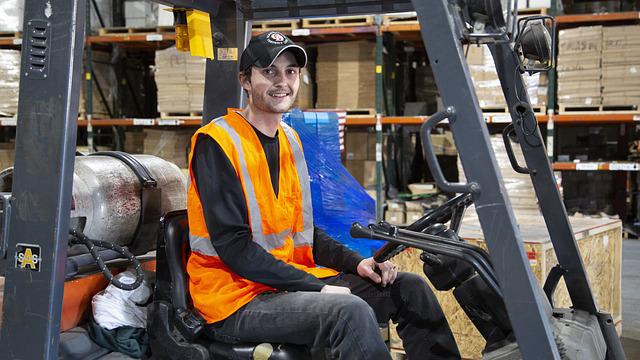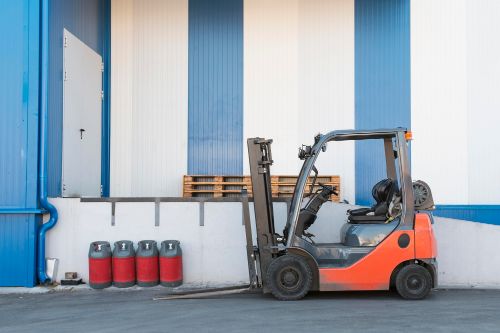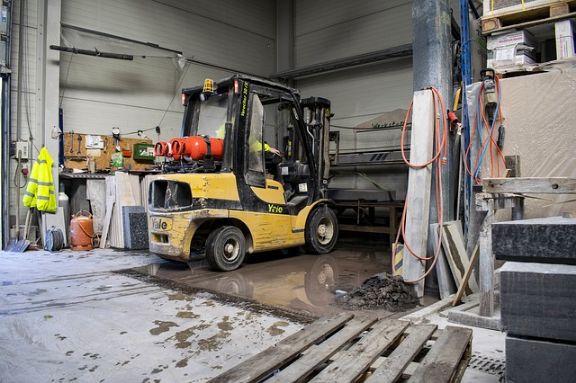
Forklift Propane Tank Exchange is a crucial service for businesses relying on propane-powered forklifts to maintain efficient operations. In 2023, as propane remains a popular choice for powering forklifts due to its clean-burning nature and cost-effectiveness, finding a reliable and convenient propane tank exchange service is essential.
This article will discuss the current costs associated with forklift propane tank refills and provide guidance on how to find reputable providers that offer this service. By understanding the factors affecting the cost and identifying reliable sources for tank exchanges, businesses can optimize their operations and ensure a consistent supply of propane for their forklift fleet.
How Much Does It Cost
The cost of a forklift propane refill can vary depending on several factors, including your location, the size of the propane cylinder, and current propane market prices. As of this writing (April 2023), the average price for a forklift propane refill ranged from $2.50 to $4.00 per gallon. However, prices may have changed since then, so it is essential to check current local rates.
To get an accurate estimate of the cost of a forklift propane refill, consider the following steps:
- Determine the size of your propane cylinder: Forklift propane cylinders typically range from 33 to 43 pounds (approximately 8 to 10 gallons). The larger the cylinder, the more propane it will require, and the higher the cost of the refill.
- Check local propane prices: Propane prices can vary by region due to factors like transportation costs and regional supply and demand. Look up current prices in your area to get an accurate estimate of the cost per gallon.
- Calculate the cost: Multiply the size of your propane cylinder (in gallons) by the local cost per gallon to estimate the total cost of the refill. For example, if your cylinder holds 8 gallons and the local price is $3.00 per gallon, the estimated cost for a refill would be $24.00.
- Consider additional fees: Some propane retailers may charge additional fees for services like cylinder inspection, maintenance, or delivery. Be sure to factor these fees into your cost estimate.
It’s also worth noting that buying propane in bulk or entering into a contract with a propane supplier may result in lower per-gallon prices. To get the best deal, consider comparing prices and services among local propane retailers.
Who Fills Forklift Propane Tank Exchange Near Me
To find a forklift propane tank exchange service near you, follow these detailed steps:
- Online search: Utilize search engines like Google or Bing to conduct a thorough search for “forklift propane tank exchange near me” or “propane refill near me.” The search results will provide you with a comprehensive list of local propane retailers, suppliers, or exchange services in your vicinity. Spend some time going through their websites, comparing their services, and reading customer testimonials.
- Maps applications: Use mapping applications such as Google Maps or Apple Maps to pinpoint nearby propane retailers or exchange services. Enter search terms like “propane tank exchange” or “propane refill” within the app, and it will display the available options around your location. These applications often include user reviews and ratings, which can provide valuable insights into the quality of service provided by each option.
- Local directories: Check local directories like the Yellow Pages, Yelp, or other regional online directories to find propane retailers or exchange services in your area. These platforms typically feature customer reviews and ratings, allowing you to evaluate the reputation and service quality of each provider. You can also filter search results based on distance, price range, and other relevant factors.
- Hardware stores: Many hardware stores, including large chains like Home Depot and Lowe’s, as well as local independent establishments, offer propane tank exchange services. Call or visit your nearest hardware store to inquire about their forklift propane tank exchange options. If they don’t offer the service, they might be able to recommend a nearby location that does.
- Gas stations: Some gas stations, particularly those with convenience stores or larger fueling centers, offer propane tank exchange services. Visit or call local gas stations to inquire about their propane exchange offerings, and ask if they cater to forklift propane tanks specifically.
- Industrial gas suppliers: Companies specializing in supplying industrial gases, such as Airgas, Praxair, or local suppliers, often provide propane tank exchange services for forklifts and other industrial equipment. Browse their websites or contact their customer service departments to inquire about their services, pricing, and delivery options.
- Trade associations: Consult trade associations or industry groups related to propane or forklifts in your region, as they can provide you with valuable information and resources, including lists of certified and reputable propane retailers or exchange services.
- Networking: Reach out to friends, family, or colleagues in your area, particularly those working in industries that frequently use forklifts, for recommendations on where they exchange or refill their forklift propane tanks. They can share their experiences and offer suggestions based on their satisfaction with specific providers.
- Social media: Utilize social media platforms like Facebook, Twitter, or LinkedIn to ask for recommendations from your network or local community groups. People often share their experiences and opinions on these platforms, which can provide useful information to help you make an informed decision.
Remember to spend time comparing the prices, services, contract options, and customer service quality among different providers to find the most convenient and cost-effective solution for your forklift propane tank exchange needs.
How to Choose a Propane Retailer
Choosing the right propane retailer is essential for your safety, convenience, and budget. Here are some key factors to consider when selecting a propane retailer:
- Location: Look for retailers in your area, as proximity can affect delivery times and costs. A closer retailer usually means faster service and lower transportation fees.
- Reputation: Research customer reviews and testimonials to gauge the reputation of the retailer. You can check online review platforms, social media pages, or ask for recommendations from friends and family.
- Pricing: Compare prices among different propane retailers to find the best deal. Keep in mind that the lowest price may not always guarantee the best service. Pay attention to hidden fees, such as delivery, tank rental, or maintenance costs.
- Contract options: Some propane retailers offer various contract options, such as fixed pricing, pre-buy, and budget payment plans. Choose a retailer that offers a contract that suits your needs and preferences.
- Customer service: Quality customer service is vital for addressing issues, answering questions, and resolving emergencies. Check whether the retailer offers 24/7 customer support and how they handle complaints and emergencies.
- Safety record: Research the retailer’s safety record and the training they provide to their employees. A reputable propane retailer will prioritize safety and adhere to industry regulations.
- Services offered: Consider the range of services provided by the retailer. Some retailers offer additional services like tank installation, maintenance, and appliance installation. Choose a retailer that can cater to your specific needs.
- Payment options: Evaluate the payment options offered by the retailer. A good retailer should provide a variety of payment methods, such as online payments, automatic payments, or phone payments.
- Environmental commitment: If you prioritize eco-friendly practices, look for a propane retailer that demonstrates a commitment to sustainability and minimizing their environmental impact.
- Community involvement: Some retailers are actively involved in their communities, sponsoring local events or participating in charitable initiatives. If this is important to you, choose a retailer that shares your values.
By considering these factors, you can make an informed decision and choose a propane retailer that meets your needs, provides excellent service, and ensures your safety.
Do You Have High Demand for These Cylinders
If your business has a high demand for forklift propane cylinders, an on-site bulk propane tank can be an effective and cost-efficient solution. On-site bulk propane tanks offer several advantages, including:
- Lower costs: Bulk propane purchases typically result in lower per-gallon prices compared to smaller propane exchanges. This can help you save on fuel costs in the long run, especially if you have a high demand for forklift propane cylinders.
- Convenient refueling: With an on-site bulk propane tank, you can refill forklift propane cylinders directly at your facility. This eliminates the need to transport cylinders to an off-site propane retailer or wait for a delivery, streamlining the refueling process and reducing downtime.
- Customized solutions: Propane suppliers can offer tailored solutions to meet your specific needs. They can help you determine the optimal tank size, installation location, and delivery schedule based on your facility’s requirements and propane usage.
- Consistent supply: Having a bulk propane tank on-site ensures a reliable propane supply for your forklifts. This can help you maintain consistent operations and avoid potential disruptions due to propane shortages or delivery delays.
- Environmental benefits: Propane is a cleaner-burning fuel compared to gasoline or diesel. By using propane for your forklifts, you’re contributing to a reduction in greenhouse gas emissions. Additionally, bulk propane storage and delivery are more efficient, further reducing your environmental impact.
To set up an on-site bulk propane tank for your forklift cylinders, follow these steps:
- Contact propane suppliers: Reach out to local propane suppliers and discuss your business’s propane needs. Request quotes and compare prices, contract options, and services offered by different providers.
- Assess your requirements: Work with the propane supplier to determine the appropriate tank size, installation location, and delivery schedule based on your facility’s layout and propane usage patterns.
- Review safety protocols: Ensure that the propane supplier adheres to industry safety standards and regulations. Discuss safety procedures for the installation, maintenance, and operation of the bulk propane tank.
- Schedule installation: Coordinate with the propane supplier to schedule the installation of the bulk propane tank at your facility. Make sure the installation meets local codes and regulations and that your employees are trained to handle and refill propane cylinders safely.
- Establish a delivery schedule: Work with the propane supplier to set up a regular delivery schedule for propane refills, ensuring that your on-site bulk tank remains adequately stocked to meet your forklift cylinder demands.
By setting up an on-site bulk propane tank and working closely with a reputable propane supplier, you can ensure a consistent and cost-effective propane supply for your forklifts, helping to improve the efficiency and sustainability of your operations.
In Summary
The Forklift Propane Tank Exchange landscape in 2023 continues to play a vital role in supporting businesses that rely on propane-powered forklifts for their daily operations. By staying informed about current costs and identifying reputable providers, businesses can ensure they receive cost-effective and reliable service for their forklift propane needs.
As the demand for eco-friendly and efficient solutions persists, exploring options such as on-site bulk propane tanks for high-demand facilities can further contribute to the optimization of operations. Ultimately, understanding the dynamics of forklift propane tank exchanges and working with dependable providers will result in a more streamlined, cost-effective, and sustainable approach to managing a forklift fleet’s fuel supply.

Jeremy is a highly experienced professional propane technician with over 21 years of experience in the industry. Throughout his career, he has gained extensive knowledge and expertise in propane gas installation, maintenance, and repair, as well as in ensuring safety and compliance with industry standards. Mike has worked with various residential, commercial, and industrial clients, providing top-notch services and solutions to meet their propane needs. He is dedicated to his craft and passionate about delivering exceptional service to his clients.







